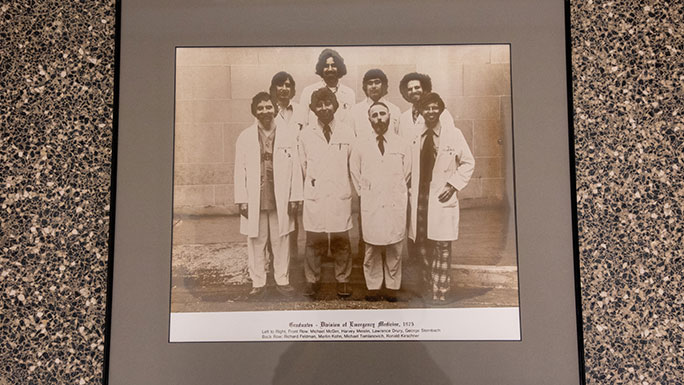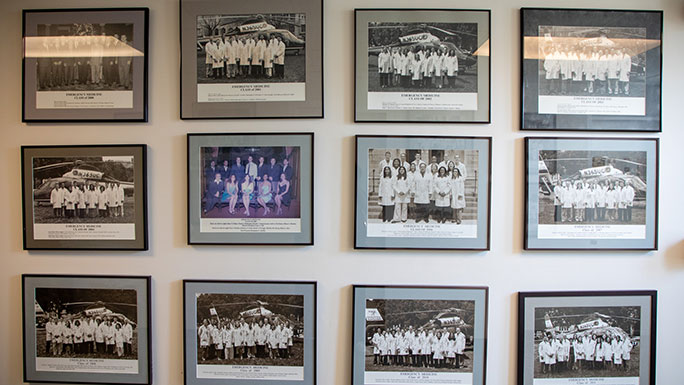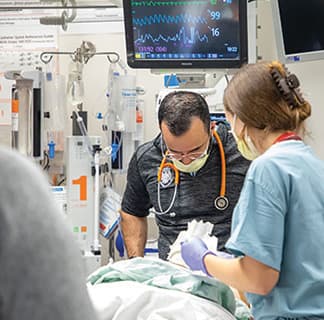UChicago Medicine's Emergency Medicine residency program marks its 50th class

The University of Chicago Medicine marked a significant milestone earlier this year by graduating its 50th class of Emergency Medicine residents, making it one of the longest-running residency programs in the country in this field.
"This speaks to the strength of the program and the fact that there's a rich alumni network that cares deeply about it," said Emergency Medicine Residency Program Director James Ahn, MD, MHPE. "Emergency medicine is a relatively young specialty, so it's definitely a historic landmark to have graduated 50 classes of trainees."

The program was launched in 1972 by Peter Rosen, MD, author of the essential Rosen's Emergency Management: Concepts and Clinical Practice textbook and considered by many to be the founding father of emergency medicine.
Rosen, a general surgeon at the time, overcame heavy institutional resistance to start the program. Only a handful of institutions, including the University of Cincinnati and University of Louisville, had such residencies.
It took until 1979 for the American Board of Medical Specialties to recognize emergency medicine as its own specialty. After Rosen's departure from UChicago in 1976, the program was led by Frank Baker, MD, another influential figure in the early days of the specialty, until it became a section within UChicago Medicine's Department of Medicine in 1987.
"It was really Dr. Rosen's vision and the force of his personality that helped get the program started," said emergency medicine physician James Walter, MD, UChicago Medicine's Chief of Emergency Medicine from 1987 to 2007.
'Mission-driven' to make a difference
Since its start, the three-year program has graduated 575 physicians, more than 40 percent of whom have gone on to lead emergency departments at other institutions. The 50th class graduation took place in June.
It has also become one of the most diverse residency programs in the country, Walter said. Hanging along a fifth-floor hallway in the old Chicago Lying-In Hospital building, framed photographs capture the changing demographics of each graduating class since 1974.

"It's fun to look back at these 50 years of photographs and see how the makeup of our residency classes has changed so dramatically over the years," Walter said.
Today, the program's 54 residents help 55 faculty members care for roughly 75,000 adult emergency medicine patients annually. From July 2023 through June 2024, nearly 4,700 adult trauma patients were treated; roughly one adult trauma patient arrived every 120 minutes, and 34% of them had penetrating injuries, mostly from guns and knives.
"We have the opportunity to literally, physically save the lives of people who could have otherwise died from lethal gunshot wounds, stab wounds and assaults," said UChicago Medicine emergency medicine physician Bernice Fokum, MD, MPP. "We take it a step further by having a violence recovery program that makes sure people have safe places to go and a safety plan once they leave the hospital so they don't come right back."
Fokum chose UChicago Medicine for her residency because of its diversity and because she could work with underserved local residents with high needs while having access to leading-edge physician-teachers and facilities, like a Level 1 trauma center that opened in 2018.
"It was hard to find a place that had the academic rigor and the backing of an institution that also had the patients I wanted to see," said Fokum.
Chief of Emergency Medicine Michael Kurz, MD, says Fokum's devotion to serving the South Side is a commitment shared throughout his team.
"The fundamental thing that attracts our residents, faculty, nurses and, frankly, everybody who slugs it out every day, is that we are mission-driven," Kurz said. "We believe fundamentally in our core that we can apply our expertise and make a difference."
Empowerment and opportunity
UChicago Medicine is known for its pioneering research in resuscitation science, and it was one of the first emergency medicine programs in the country to shift ultrasound imaging to the bedside, along with empowering faculty to initiate minimally-invasive catheter procedures to diagnose and treat heart conditions.
It also serves as the resource hospital for the Chicago South EMS System in Region 11; through the EMS Medical Director and EMS base station, it provides medical direction for EMS clinicians on the south side of Chicago as part of a citywide network of EMS services.
Ahn says the residency program aims to empower residents by creating early growth opportunities that require them to work more independently.
For instance, residents have the opportunity to do medical rotations abroad and can serve as medical escorts for foreign nationals needing repatriation by plane after suffering illnesses like strokes or heart attacks. They can also spend four weeks flying on a twin-engine Airbus EC-145 helicopter medical transport service, part of the University of Chicago Medicine Aeromedical Network (UCAN).
"These experiences work well because our training philosophy is one of early autonomy," Ahn said. " We really want to create leaders within emergency medicine, and we've been very successful doing that."

Level 1 Adult Trauma Center
The University of Chicago Medicine is designated as a Level 1 Adult Trauma Center, meaning the hospital is prepared to handle the most seriously injured trauma patients 24 hours a day, seven days a week.
Learn more About our Trauma Care